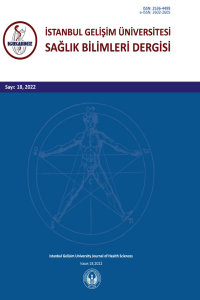Abstract
Keywords
References
- Sunal S, Çam O. Okul öncesi dönemi işitme engelli çocukların ruhsal uyum düzeylerinin incelenmesi. Çocuk ve Gençlik Ruh Sağlığı Dergisi. 2005;12(1):11-18.
- Turan Z, Koca A, Uzuner Y. İşitme kayıplı çocuğu olan bir annenin aile eğitimi sürecinin incelenmesi. Ankara Üniversitesi Eğitim Bilimleri Fakültesi Özel Eğitim Dergisi. 2019;20(1),93-117. doi:10.21565/ozelegitimdergisi.417177.
- Belgin E, Yücel E. İşitme engelli çocuklar ve eğitimleri. Özel Gereksinimli Çocuklar ve Özel Eğitim. 2011;191-213.
- Mukuria GM, Eleweke CJ. Educating Children with Deafness and Hearing Impairments International Encyclopedia of Education (3. bs.). 2010;628-633
- Küçük Y, Arıkan D. İşitme engelli çocukların topluma uyum sorunlarının incelenmesi. Anadolu Hemşirelik ve Sağlık Bilimleri Dergisi. 2006;9(4):22-30.
- Sarıkaya B, Börekçi M. İşitme engelli öğrencilerin eğitiminde yaşanan sorunlar ve çözüm önerileri: Erzurum ili örneği. Ev Akademisi Dergisi. 2016;20(66):177-192.
- Atay M. İşitme Engelli Çocukların Eğitiminde Temel İlkeler. İstanbul: Özgür Yayınları; 1999.
- Şipal RF. 7-11 yaş arası işitme engelli ve normal işiten çocukların sosyal uyum düzeylerinin incelenmesi [yayımlanmamış yüksek lisans tezi]. Ankara: Hacettepe Üniversitesi, Sağlık Bilimleri Enstitüsü;2002.
- Most, T. The effects of degree and type of hearing loss on children's performance in class. Deafness & Education International. 2004;6(3):154-166.
- Tüy SP. 3-6 yaş arasındaki işitme engelli ve işiten çocukların sosyal beceri ve problem davranışları yönünden karşılaştırılmaları [yayınlanmamış yüksek lisans tezi]. Ankara: Ankara Üniversitesi, Sosyal Bilimler Enstitüsü; 1999.
- Genç A. Okul öncesi ve ilkokul döneminde olan işitme kayıplı çocukların davranış problemlerinin incelenmesi [yüksek lisans tezi]. Eskişehir: Anadolu Üniversitesi Eğitim Bilimleri Enstitüsü; 2018.
- Houston DM, Miyamoto RT. Effects of early auditory experience on word earning and speech perception in deaf children with cochlear implants: Implications for sensitive periods of language development. OtolNeurotol. 2010;31(8):1248-1253.
- Theunissen SC, Rieffe C, Kouwenberg M, De Raeve LJ, Soede W, Briaire JJ, et al. Behavioral problems in school-aged hearing-impaired children: The influence of sociodemographic, linguistic, and medical factors. European Child & Adolescent Psychiatry. 2014;23(4):187-196.
- Yavuz H, Baran G, Bıçakçı MY. İşitme engelli ve işitme engeli olmayan 9-17 yaş grubundaki çocukların sosyal uyumlarının karşılaştırılması. Toplum ve Sosyal Hizmet Dergisi. 2010;21(1):7-23.
- Quittner AL, Leibach P, Marciel K. The impact of cochlearimplants on young deaf children: New methods to assess cognitive and behavioral development. Archives of Otolaryngology–Head&NeckSurgery. 2004;130(5):547-554.
Özel Eğitim Öncesinde ve Sürecinde İşitme Cihazı veya Koklear İmplant Uygulanan Çocukların Deneyimleri
Abstract
Keywords
Özel eğitim işitme cihazları koklear implant Special education hearing aid cochlear implant
References
- Sunal S, Çam O. Okul öncesi dönemi işitme engelli çocukların ruhsal uyum düzeylerinin incelenmesi. Çocuk ve Gençlik Ruh Sağlığı Dergisi. 2005;12(1):11-18.
- Turan Z, Koca A, Uzuner Y. İşitme kayıplı çocuğu olan bir annenin aile eğitimi sürecinin incelenmesi. Ankara Üniversitesi Eğitim Bilimleri Fakültesi Özel Eğitim Dergisi. 2019;20(1),93-117. doi:10.21565/ozelegitimdergisi.417177.
- Belgin E, Yücel E. İşitme engelli çocuklar ve eğitimleri. Özel Gereksinimli Çocuklar ve Özel Eğitim. 2011;191-213.
- Mukuria GM, Eleweke CJ. Educating Children with Deafness and Hearing Impairments International Encyclopedia of Education (3. bs.). 2010;628-633
- Küçük Y, Arıkan D. İşitme engelli çocukların topluma uyum sorunlarının incelenmesi. Anadolu Hemşirelik ve Sağlık Bilimleri Dergisi. 2006;9(4):22-30.
- Sarıkaya B, Börekçi M. İşitme engelli öğrencilerin eğitiminde yaşanan sorunlar ve çözüm önerileri: Erzurum ili örneği. Ev Akademisi Dergisi. 2016;20(66):177-192.
- Atay M. İşitme Engelli Çocukların Eğitiminde Temel İlkeler. İstanbul: Özgür Yayınları; 1999.
- Şipal RF. 7-11 yaş arası işitme engelli ve normal işiten çocukların sosyal uyum düzeylerinin incelenmesi [yayımlanmamış yüksek lisans tezi]. Ankara: Hacettepe Üniversitesi, Sağlık Bilimleri Enstitüsü;2002.
- Most, T. The effects of degree and type of hearing loss on children's performance in class. Deafness & Education International. 2004;6(3):154-166.
- Tüy SP. 3-6 yaş arasındaki işitme engelli ve işiten çocukların sosyal beceri ve problem davranışları yönünden karşılaştırılmaları [yayınlanmamış yüksek lisans tezi]. Ankara: Ankara Üniversitesi, Sosyal Bilimler Enstitüsü; 1999.
- Genç A. Okul öncesi ve ilkokul döneminde olan işitme kayıplı çocukların davranış problemlerinin incelenmesi [yüksek lisans tezi]. Eskişehir: Anadolu Üniversitesi Eğitim Bilimleri Enstitüsü; 2018.
- Houston DM, Miyamoto RT. Effects of early auditory experience on word earning and speech perception in deaf children with cochlear implants: Implications for sensitive periods of language development. OtolNeurotol. 2010;31(8):1248-1253.
- Theunissen SC, Rieffe C, Kouwenberg M, De Raeve LJ, Soede W, Briaire JJ, et al. Behavioral problems in school-aged hearing-impaired children: The influence of sociodemographic, linguistic, and medical factors. European Child & Adolescent Psychiatry. 2014;23(4):187-196.
- Yavuz H, Baran G, Bıçakçı MY. İşitme engelli ve işitme engeli olmayan 9-17 yaş grubundaki çocukların sosyal uyumlarının karşılaştırılması. Toplum ve Sosyal Hizmet Dergisi. 2010;21(1):7-23.
- Quittner AL, Leibach P, Marciel K. The impact of cochlearimplants on young deaf children: New methods to assess cognitive and behavioral development. Archives of Otolaryngology–Head&NeckSurgery. 2004;130(5):547-554.
Details
| Primary Language | Turkish |
|---|---|
| Subjects | Clinical Sciences |
| Journal Section | Articles |
| Authors | |
| Publication Date | December 31, 2022 |
| Acceptance Date | December 16, 2022 |
| Published in Issue | Year 2022 Issue: 18 |
![]() Attribution-NonCommercial-NoDerivatives 4.0 International (CC BY-NC-ND 4.0)
Attribution-NonCommercial-NoDerivatives 4.0 International (CC BY-NC-ND 4.0)

